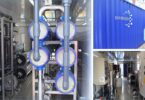The Toronto, Ontario metropolitan area has seen rapid population growth over the last several decades and has also developed a Wet Weather Flow Master Plan that aims to virtually eliminate Combined Sewage Overflows (CSO) from the sewage collection system.
To support this expansion, Xylem (NYSE:XYL), a leading global water technology company, has been selected by the City of Toronto to supply customized equipment for a new integrated pumping station (IPS) – a critical component that ensures reliable and safe transport of wastewater. The project will replace two existing pumping stations, one operating since 1911 and the other since the early 1970s, both adjacent to the Ashbridges Bay Wastewater Treatment Plant.
The plant’s new IPS will include 14 Flygt A-C series dry pit pumps. These pumps, designed for low maintenance and operational costs, will reduce Toronto’s energy consumption rate and ensure reliable station operation.
“As Toronto continues to grow, we are proud to support such a large and complex project,” said Matthew Pine, Chief Operating Officer, Xylem. “Xylem’s highly efficient solutions, expertise and local presence will help ensure safe, reliable and sustainable wastewater treatment for generations to come.”
Once operational, this IPS will move raw sewage from the underground sewer system into the treatment plant. In addition, the IPS will add Wet Weather Flow pumping capability to pump collected CSOs from the new Don River and Central Waterfront tunnel system, to a new high-rate treatment facility.
Xylem’s Pewaukee, Wisconsin facility will design, build and test the customized equipment. Life cycle services will be provided by Xylem’s three Service Centers near Toronto in Etobicoke, Ottawa and Sudbury. Certified and factory-trained technicians will provide the necessary expertise for installation, training, monitoring/diagnostic and maintenance.
The project is currently in its design stage; construction is expected to start in 2025 and take ten years to complete.







